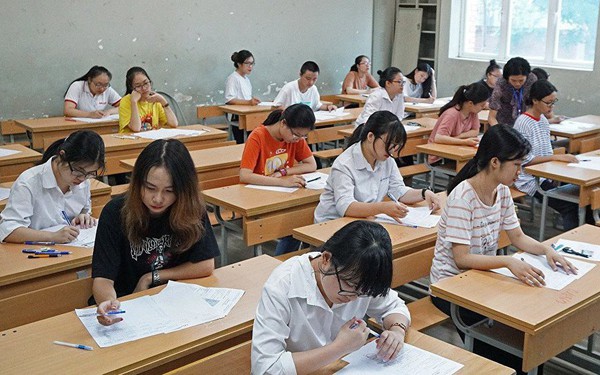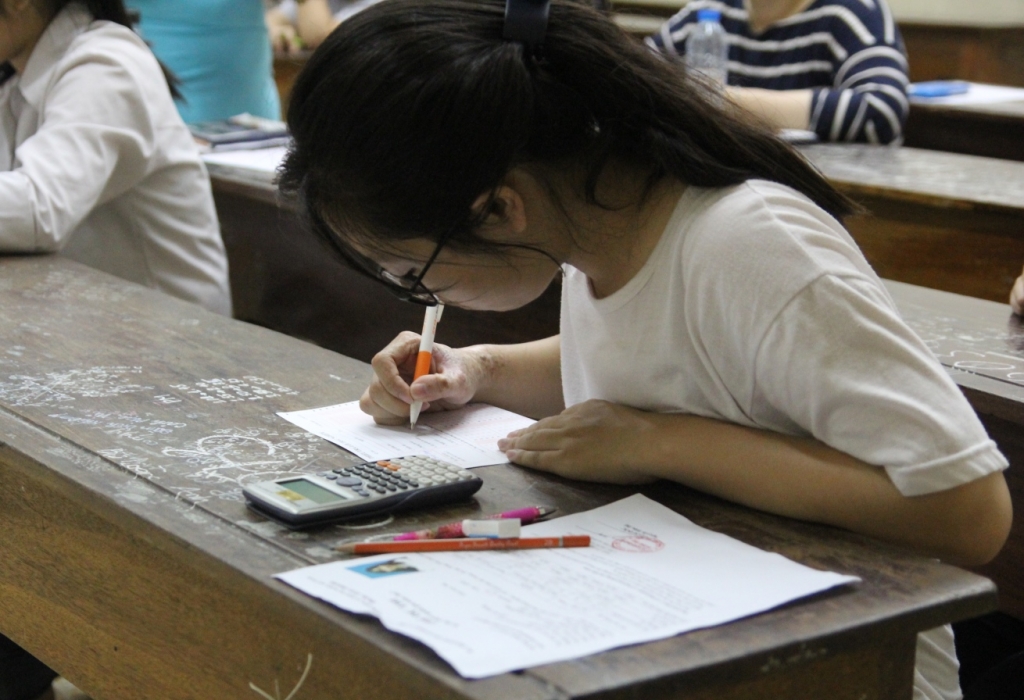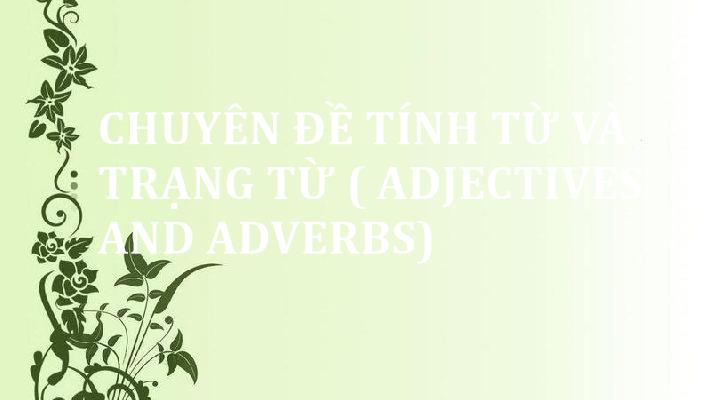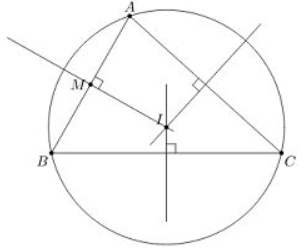MỆNH ĐỀ TRẠNG NGỮ (ADVERBIAL CLAUSES)
- Định nghĩa: Mệnh đề trạng ngữ là mệnh đề phụ
trong câu ghép, được sử dụng như một trạng từ
- Phân loại: gồm có 9 loại mệnh đề
trạng ngữ như sau:
-
Mệnh đề trạng ngữ chỉ thời gian
-
Mệnh đề trạng ngữ chỉ nhượng bộ
-
Mệnh đề trạng ngữ chỉ nguyên nhân
-
Mệnh đề trạng ngữ chỉ kết quả
-
Mệnh đề trạng ngữ chỉ mục đích
-
Mệnh đề trạng ngữ chỉ nơi chốn
-
Mệnh đề trạng ngữ chỉ cách thức
-
Mệnh đề trạng ngữ chỉ điều kiện
-
Mệnh đề trạng ngữ chỉ so sánh
I. MỆNH ĐỀ TRẠNG NGỮ CHỈ THỜI GIAN
- Định nghĩa: Mệnh đề trạng ngữ chỉ
thời gian là mệnh đề được bắt đầu bởi một trong các liên từ chỉ thời gian như:
when, before, while, after, until, til, as soon as, by the time,....v.v.
- CÔNG THỨC TỔNG QUÁT:
*NOTES:
1. Trường hợp 1: Nếu hành động xảy ra ở thì
tương lai
EX: When you (finish) that book, please return to me.
→ have finished/ finish
I (call)
you when I (come) home.
→
will call/ come
Wait
here until it (stop) raining.
→ stops
2.
Trường hợp 2: Nếu hành động xảy ra ở quá khứ hoặc hiện tại:
- Cần phải xét đến
quan hệ giữa các hành động trong
câu:
■ When + S + V_quá khứ đơn, S + V_quá khứ đơn → Liệt kê các hành động
■ When + S + V_quá khứ đơn, S + V_quá khứ hoàn thành → Hành động trước – sau
■When + S + V_quá khứ đơn, S + V_quá khứ tiếp diễn → Hành động xen vào
■ Before + S + V_quá khứ đơn, S + V_quá khứ hoàn thành → Hành động trước – sau
■ After + S +V_quá khứ hoàn thành, S + V_quá khứ đơn → Hành động trước sau
EX: When I ate lunch, she went out.
When
I came to the party last night, everybody had left.
When
I arrived, he was talking on the phone.
Before
I went to bed, I had done my homework.
After I had done my homework, I went to bed.
While
I was doing my homework, she was cooking.
Since
2015, I haven’t seen her.
As soon as
I went home, I called you.
By the time I got married to him, we had dated for 8 years.
3. Trường hợp 3: Nếu S1 trùng với
S2 (tức là hai mệnh đề có cùng chủ ngữ) thì ta có thể rút gọn câu như sau:
II. MỆNH ĐỀ TRẠNG NGỮ
CHỈ NHƯỢNG BỘ
- Định nghĩa: Là mệnh đề bắt đầu bởi các liên từ
mà khi kết hợp hai về có ý nghĩa trái ngược nhau.
-
CÔNG THỨC TỔNG QUÁT: “MẶC DÙ......., VẪN......”
EX: Although it was raining very hard, I
went to school on time.
(Mặc dù trời đã mưa rất nặng hạt nhưng tôi vẫn
đến trường đúng giờ.)
*NOTE: Ta có thể dùng
cụm giới từ để thay thế cho
liên từ ở mệnh đề phụ:
EX1: In spite of the very hard rain, I
went to school on time.
EX2: Although Hoa is lazy, she is quite
smart.
=
Despite being lazy, Hoa is quite smart.
=
In spite of her laziness, Hoa is quite smart.
EX3: Although English is important,
students still ignore it.
=
Despite the importance of English, students still ignore it.
III. MỆNH ĐỀ TRẠNG NGỮ
CHỈ NGUYÊN NHÂN
- CÔNG THỨC TỔNG
QUÁT: “BỞI VÌ..... NÊN....”
EX: Because she was lazy, she failed the
test.
Because I didn’t have breakfast, I feel hungry
now.
*NOTE:
- Ta có thể dùng cụm giới từ để thay thế cho liên từ ở mệnh đề phụ:
EX: Because of being lazy, she failed
the test.
=
Because of her laziness, she failed the test.
Because of the disability, she couldn’t
speak.
=Now
that she was disable, she couldn’t speak.
- Một số cấu trúc tương đương nghĩa:
IV. MỆNH ĐỀ TRẠNG NGỮ CHỈ KẾT QUẢ
- CÔNG THỨC TỔNG
QUÁT: “QUÁ..... ĐẾN NỖI MÀ...”
EX: This lesson is so long that we
can’t study it.
=
It is such a long lesson that we can’t study it.
=
This lesson is too long for us to study.
=
This lesson is not short enough for us to study.
=
It is so long a lesson that we can’t study it.
=
Song long is the lesson that we can’t study it.
=
Such is a long lesson that we can’t study it.
*NOTE:
- Các cấu trúc tương đương nghĩa:
■ S + V + too + adj/adv + for O + to V_inf.
■ S + V + adj/adv + enough + for O + to V_inf.
■ S + V + so adj/adv + N + that + S + V.
■ such + (a/an) + adj +
N + that ...
=
such a lot of + N + that....
=
so many/ much + N + that.....
- Cấu trúc đảo ngữ:
■ So + adj/adv + S + V + that + S + V.
■ Such + V + a/an N + that + S + V.
EX: He danced so well that everyone
admired him.
=
So well did he dance taht everyone admired him.
V. MỆNH ĐỀ TRẠNG NGỮ CHỈ MỤC ĐÍCH:
“.....ĐỂ....”
- CÔNG THỨC TỔNG
QUÁT:
EX: The boy entered the room silently so
that he didn’t wake the baby up.
=
The boy entered the room silently in order not to wake the baby up.
For fear that he can’t do the test well, he
revises the lessons very carefully.
=
So as to do the test well, he revises the lessons very carefully.
He saved money so that he could buy a flat.
=
He saved money to buy a flat.
=
He saved money for a flat.
VI. MỆNH ĐỀ TRẠNG NGỮ
CHỈ NƠI CHỐN
- Định nghĩa : Mệnh đề trạng ngữ chỉ nơi chốn là mệnh
đề bắt đầu bởi liên từ chỉ nơi chốn: Where, Wherever.
- CÔNG THỨC TỔNG QUÁT:
|
Where/
Wherever + S + V, mệnh đề chính ( main clause). |
EX: I will go to the palces, where you
want.
I
will go wherever you go.
VII. MỆNH ĐỀ TRẠNG NGỮ
CHỈ CÁCH THỨC
-
Định nghĩa: là mệnh đề trạng ngữ được bắt đầu bởi as
though/ as if.
- CÔNG THỨC TỔNG QUÁT: “.... NHƯ THỂ
LÀ...”
EX: He runs as if/ as though he is being
chased by a dog.
→ có thể xảy ra ở hiện tại
và tương lai
He
says as if he were my father.
→ không thể xảy ra ở hiện
tại và tương lai
She
described her village as though it had had some problems.
→ không thể xảy ra ở quá
khứ
VIII. MỆNH ĐỀ TRẠNG NGỮ
CHỈ ĐIỀU KIỆN [CÂU ĐIỀU KIỆN]
*
Câu điều kiện gồm 2 phần:
- Một mệnh đề bắt đầu bằng “if”
(mệnh đề điều kiện)
-
Một mệnh đề nêu lên kết quả (mệnh đề chính).
® Nếu
mệnh đề “If” đứng đầu thì giữa 2 mệnh đề có dấu (,).
1. Câu điều kiện loại I (Conditional
sentence Type I)
a. Cấu trúc (Form).
|
Mệnh đề If (If clause) |
Mệnh đề chính (Main clause) |
|
S + V/V-s/es (Simple Present) |
S + will/shall + Vinf
can/may (Simple Future) |
b. Cách dùng (Usage).
*
Diễn tả những hành động, sự việc có thể xảy ra, hoặc không thể xảy ra ở hiện
tại hoặc tương lai. (câu điều kiện loại I diễn tả 1 điều kiện có khả năng trở
thành hiện thực)
Ví dụ:
- If
you press the red button, the car stops/ will stop.
Nếu bạn ấn cái nút màu đỏ, chiếc xe sẽ dừng lại.
- The dogs will bite you if you touch him.
Con chó sẽ cắn bạn nếu bạn chạm vào nó.
-If you study hard, you can get good grades.
Nếu em học chăm, em có thể đạt điểm cao.
*BIẾN THỂ: nếu câu điều kiện loại I diễn tả 1 mệnh lệnh, yêu cầu,
đề nghị thì mệnh đề chính có thể thay bằng câu mệnh lệnh.
(+) (Please) V
(-) (Please) Don’t V
Ví dụ:
- If you do past the grocery store, buy me some eggs.
Nếu bạn đi qua cửa hàng tạp hóa, mua cho tôi mấy quả trứng.
- Don’t sleep in the classroom if you don’t want your teacher to be angry.
Đừng ngủ trong lớp nếu bạn không muốn giáo viên nổi giận.
*NOTES:
* Nếu các câu điều kiện diễn tả 1 việc tất
yếu xảy ra, khi ta thực hiện được việc trong mệnh đề “If” thì ta có thể dùng
thì hiện tại đơn ở mệnh đề chính thay vì tương lai đơn (zero conditional
sentence).
Ví dụ:
- If you stand in the sun for a long time, your skin gets darker.
Nếu bạn đứng dưới nắng
quá lâu, da bạn sẽ xạm đi.
- If you boils water to 1000C, it boils.
Nếu bạn đun nước tới 1000C thì nước sôi.
*
Nếu ở mệnh đề “If” là 1 hành động chắc chắn xảy ra thì có thể thay “If”
bằng “when”.
Ví dụ:
- When you boils water to 1000C, it boils.
Khi bạn đun nước tới 1000C thì nước sôi.
2. Câu điều kiện loại II (Conditional sentence Type
II)
a. Cấu trúc (Form).
|
Mệnh đề If (If clause) |
Mệnh đề chính (Main clause) |
|
S + V-ed/VI (Past subjunctive/Simple Past) |
S + would/could/might + Vinf (Present Conditional) |
*
Thì quá khứ giả định (Past Subjunctive) giống như thì quá khứ đơn, riêng
động từ “to be” được chia là “were” cho tất cả các ngôi; tuy nhiên trong văn
nói ta có thể dung “was” vói I, He, She, It.
*
Would thường được viết tắt là ’d.
b. Cách dùng (Usage).
*
Diễn tả 1 hành động, sự việc không thể xảy ra hoặc không thể thực hiệ ở hiện
tại hoặc tương lai.
Ví dụ:
- If Kien knew the answer, he would tell everyone. (But he don’t know now)
Nếu Kiên biết đáp án, anh ấy sẽ nói cho mọi người. (Nhưng giờ anh ấy không
biết)
- If I had a cake, I would eat it up.
Nếu tôi có 1 cái bánh, tôi sẽ ăn hết luôn.
- If I were you, I would go to England
Nếu tôi là bạn, tôi sẽ đi Anh.
*BIẾN THỂ:
* Biến thể của mệnh đề “If”: khi muốn nhấn
mạnh ý tiếp diễn của hành động trong mệnh đề “If”, ta thay Quá khứ đơn
bằng Quá khứ tiếp diễn.
*
Biến thể của mệnh đề chính: khi muốn nhấn mạnh ý tiếp diễn của hành động
trong mệnh đề chính ta sử dụng:
|
|
would |
|
|
|
S
+ |
could |
+ be V_ing |
|
|
|
might |
|
|
3. Câu điều kiện loại III
(Conditional sentence Type III)
a. Cấu trúc (Form).
|
Mệnh đề If (If clause) |
Mệnh đề chính (Main clause) |
|
S + had + past participle (VII) (Past Perfect) |
S + would/could have + VII (Perfect Conditional) |
b.
Cách dùng (Usage).
* Diễn tả 1 hành động, sự việc không thể
xảy ra hoặc không thể thực hiện được ở quá khứ.
Ví dụ:
-
If I had studied harder, I would have passed the exam. (But I didn’t)
Nếu tôi học hành chăm chỉ hơn thì tôi đã vượt qua được kì thi rồi. (Nhưng tôi
đã không chăm)
-
If she had invited me to the party, I wouldn’t have had to go to the
supermarket with my mom.
Nếu cô ấy mời tôi đi dự tiệc, tôi đã không phải đi siêu thị với mẹ rồi.
*BIẾN THỂ:
*
Khi muốn nhấn mạnh ý tiếp diễn của hành động trong câu điều kiện loại III, có
thể thay thì Quá khứ hoàn thành trong mệnh đề “If” bằng Quá khứ hoàn thành tiếp
diễn; thay cách thức của mệnh đề chính bằng “would have been V_ing”.
Ví dụ:
-
If it hadn’t been raining at 8 p.m yesterday, he wouldn’t have been walking in
the rain.
Nếu
hôm qua trời không mưa vào lúc 8 giờ tối thì anh ta đã không phải đi trong mưa
rồi.
4. Câu điều kiện hỗn hợp (Mixed
conditional).
a. Cấu trúc (Form).
|
Mệnh đề If (If clause) |
Mệnh đề chính (Main clause) |
|
S + had + past participle (VII) (Past Perfect) |
S + would/could + Vinf (Present Conditional) |
b. Cách dùng (Usage).
*
Diễn tả điều kiện giả định ở quá khứ và kết quả không thực hiện được ở hiện
tại.
Ví dụ:
- If he hadn’t walk in the rain last night, he wouldn’t be sick now.
Nếu tối qua anh ta không đội mưa, bây giờ anh ta đã không bị ốm.
=> THAM KHẢO
THÊM TẠI: https://loga.vn/bai-viet/1125/cau-dieu-kien-conditional-sentences
IX. MỆNH ĐỀ TRẠNG NGỮ CHỈ SO SÁNH [CÂU SO SÁNH]
1.
So sánh với trạng từ
|
DẠNG |
CÔNG THỨC CHUNG |
VÍ DỤ |
|
So sánh bằng |
S1 + Verb + as + Adv + as + S2 |
He did the test as bad as I did. |
|
So sánh không bằng |
S1 + Verb + not + as + Adv + as + S2 |
He doesn’t drive as carfully as his brother. |
|
So sánh hơn |
* Với trạng từ ngắn giống hệt tính từ: long, wide, high, fast, hard,
close, early, late, low S1 + Verb + Adv-er + than S2 * Với trạng từ dài: S1 + Verb + more + Adv + than + S2 |
* Với trạng từ ngắn: My sister runs faster than me. * Với trạng từ dài: She sings more beautifully than her classmate. |
|
So sánh nhất |
* Với trạng từ ngắn: S + Verb + the Adv-est * Với trạng từ dài: S + Verb + the most + Adv |
* Với trạng từ ngắn: He runs the fastest in my class. * Với trạng từ dài: He drives the most carelessly among us |
2.
So sánh với tính từ (ngắn, dài, đặc biệt)
a. Tính từ ngắn:
- Là tính từ có 1 âm
tiết, mình chỉ đọc 1 âm
Ví dụ: good, nice, great,
poor, warm.
*Cách sử dụng tính từ ngắn
a)
So sánh HƠN : tính từ + er + than
b) So sánh NHẤT : tính từ + est
Ví dụ : warm – warmer –
warmest
short – shorter – shortest
- Tính từ tận cùng
bằng phụ âm + y phải đôi y thành i trước khi thêm er hoặc est.
Ví dụ: dry
(khô) Ø drier (khô hơn) Ø driest (khô nhất);
happy (hạnh phúc) Ø happier (hạnh phúc
hơn) Ø happiest (hạnh phúc nhất)
b. Tính từ dài: Hai
âm tiết, và những âm tiết kết thúc bằng –ed.
Ví
dụ:
careful, beautiful, hard-working, careless, complicated, bored…
* Lưu ý: Các tính từ kết thúc bằng -er, -le,
-ow và -et, được coi là cả hai tính từ ngắn và dài.E.g: clever, simple,
narrow, quiet, …
*Cách sử dụng tính từ dài:
a) So sánh HƠN: MORE + tính từ dài.
b) So sánh NHẤT: MOST + tính từ dài.
Ví dụ: more beautiful – most beautiful....
Chú ý:
Sử dụng so sánh hơn khi có 2 đối tượng.
Sử dụng so sánh nhất khi có 3 đối tượng trở lên
Ví dụ:
A is more intelligent than B: A thì thông minh hơn B
B is more intelligent than C: B thì thông minh hơn C
A is the most intelligent in three students: A thì thông
minh nhất trong 3 học sinh
c. Tính từ đặc biệt: là
những người có mô hình so sánh khác với tính từ ngắn và dài. Nhóm này bao gồm: good, bad, well, ill, old,
far (adj), and well, badly, far, little, much
|
No |
Equal
degree |
Comparative |
Superlative |
Meaning |
|
1. |
bad/badly/
ill |
Worse |
worst |
Tồi,
dở/ ốm yếu |
|
2. |
good/
well |
Better |
best |
Tốt,
giỏi |
|
3. |
much |
More |
most |
Nhiều |
|
4. |
little |
Less |
least |
Ít |
|
5. |
far |
farther/
further |
farthest/
furthest |
Xa
(distance) / Rộng (range) |
|
6. |
old |
older/
elder |
oldest/
eldest |
Già,
cũ (for all)/ (brother/ sister) |
E.g: Ms Anh is better at
cooking than Ms Nhung.
d. So sánh bằng:
*CÔNG THỨC:
S + V + as + Adj/Adv + as + S+ V
+ Pr/N
Eg: I am as tall as you. (Tôi
cao bằng bạn)
-Trong so sánh “không
bằng” ta có thể dùng so…as thay cho as….as:
Eg: I am not
so tall as you.
-So sánh cho cùng một đối
tượng nhưng khác yếu tố so sánh.
Eg: Mary was as intelligent
as she was beautiful.
-So sánh khác đối tượng
lẫn yếu tố so sánh.
She is as kind as her
brother is honest.
-Có thể thêm các chữ sau đây trước so sánh bằng để
làm rõ nghĩa hơn: exactly = just, nearly= almost, hardly, twice,
threetimes…
Eg: I am exactly/ just as tallas
you.
Eg: I am almost/ nearly as
tall as you.
e. So sánh hơn:
*CÔNG
THỨC TÍNH TỪ NGẮN:
S + V + Adj/ Adv +er (+ than+ N/S+V)
Thêm er sau tính
từ. Nếu phía sau có đối tượng so sánh thì thêm than.
Eg: I am taller.
I am
taller than you.
*CÔNG THỨC TÍNH TỪ DÀI:
S+ V + More +Adj/Adv (+ than N/S + V)
Thêm more trước
tính từ. Nếu phía sau có đối tượng so sánh thì thêm than.
Eg: I
am more beautiful.
Eg: I am more beautiful than you.
- So sánh hơn có thể
được nhấn mạnh thêm bằng cách cộng "much/far/a lot"
hoặc giảm nhẹ bằng cách cộng thêm "a bit/a
little/slightly" trước hình thức so sánh.
Eg: I
am far taller than you.
Eg: I am much more
beautiful than you.
Eg: This house
is slightly more expensive than that one.
f. So
sánh nhất:
*CÔNG THỨC TÍNH TỪ NGẮN:
S+ V + The Adj/Adv + Est (N) + in + collective Nouns
of + plural nouns
- Thêm the trước
tính từ và thêm est sau tính từ. Phía sau có thể có N hoặc
không.
Eg: I am the tallest. (Tôi
cao nhất)
Eg: I am the tallest
student in the class.
- Nếu muốn nói nhất
trong số các đối tượng thì dùng of phía sau.
Eg: Mary is the tallest of
the three girls.
- Cũng có thể để
cụm of….. đầu câu:
Eg: Of the three girls,
Mary is the tallest.
*CÔNG THỨC TÍNH TỪ
DÀI: S + V + the most +Adj (N)
Thêm the
most trước tính từ. Phía sau có thể có N hoặc không.
- Có thể dùng với BY
FAR, THE SECOND, THE FIRST ……trước so sánh nhất để nói rõ về sự chênh lệch giữa
đối tượng đứng nhất với các đối tượng khác.
Eg: I am the
most beautiful. (Tôi đẹp nhất)
- Cần phân
biệt the least (ít nhất) với in the least trong cấu
trúc not..in the least ( Không…chút nào)
Eg: I am the
least surprised. (Tôi ít ngạc nhiên nhất)
Eg: I am not in the
least surprised. (Tôi chẳng ngạc nhiên chút nào)
( Các cụm từ sau đây
cũng có thể dùng tương đương với not….in the least trong công thức
trên: in the slightest,the least bit… Nhóm cụm từ này có thể để sau tính
từ.)
=> THAM KHẢO THÊM TẠI: https://loga.vn/bai-viet/1247/cac-dang-so-sanh-trong-tieng-anh
X. BÀI TẬP
Exercise 1
1. Last Sunday
is was_____ wet _____ we couldn't go to the movies.
a. so -
that b. as - as c. less - than d. more - than
2. I did
it_____ they asked me to.
a.
because b. because of c. the reason d. since
3. The
corresponding sentence "There are so many things for me to do that…"
is_____
a. have
so many things to do that b.
nobody has so many….
c. so
many things are on me d.
I do many things.
4. He
was_____ tired that he slept all day.
a. such b. too c. so d. very
5. The by
was happy_____ he had done a good job.
a.
because b. as c. unless d. because of
6. Although
he tried hard, _____
a. but
he failed b. yet he failed c. however he failed d. he failed
7. It
was_____ that we had gone for a walk.
a. such
a beautiful weather b.
such a ice weather
c. so
nice a weather d.
so beautiful a night
8. Last
yeas I earned _____my sister, who has a better position.
a.
twice as much as b. twice more than b. twice as many as d. twice as more as
9. _____
the room, the man was no longer there.
a.
Entering b. When we entered
c.
On entering d. Having entered
10. It looks
as if the game_____ unless the rain stops.
a. will
cancel b. would be cancelled c. will be cancelled d. would cancel
11. _____
Mrs. Richards was entering the dining-room, there was a knock on the front
door.
a. At
the very moment b. So long as c. Only when d. During the time
12. When did
you eat? As soon as he came, we _____ our dinner.
a. must
have eaten b. ate c. were eating d. had eaten
13. How can
we measure the price and things? However much_____ it will be worth it.
a. it
cost b. it costs c. does it cost d. costs it
14. "The
new mathematics teachers seems very pleasant".
a. a
such nice b. a so nice c. such nice d. such a nicw
15. "I
find the local newspaper to be _____ uninformative".
"Yes,
there is hardly any international news".
a. so b. such c. so much d. such much
16. "Here,
I brought you some flowers from my garden".
"Thank
you. They're_____ beautiful colors".
a. so b. as c. such d. too
17. "Do
you know why Erica failed the test?"
"I
don't know. She spent_____ time studying".
a. so b. such much c. so much d. much
18. "Wendy
is really tall for her age".
"She
is so tall_____ her friends make fun of her".
a. so b. as c. that d. much
19. Some
people are tall, _____ others are short.
a.
whereas b. when c. as d. so
20. In some
nations coffee is the favourite beverage, _____ in others it is tea.
a. when b. where c. while d. which
Exercise 2
1. After
Jessica_____ her agree, she intends to work in her father's company.
a. will
finish b. will have finished
c.
finishes d. is finishing
2. By the
time I go to bed tonight, I _____ my work for the day.
a. will
finish b. have finished c. will have finished d. finish
3. When my
parents_____ for a visit tomorrow, they will see our new baby of the first
time.
a. will
arrive b. arrived c. will have arrived d. arrived
4. Fatemah
looked down to discover a snake at her feet. When she saw it, she_____
a. was
screaming b. had screamed c. screamed d. screams
5. By the
time Alfonso finally graduated from high school, he_____ seven different
schools because his parents moved frequently.
a.
attended b. was attending c. had attended d. had been attending
6. Until
you learn to relax more, you_____ your ability to speak English.
a.
haven't improved b. aren't improving c. don't improve d. won't improve
7. I
borrowed four books on gardening the last time I _____ to the library.
a. go b. went c. had gone d. have gone
8. Before I
stated the car, all of the passengers_____ their seat belts.
a. will
buckle b. had buckled c. buckle d. have buckled
9. It seems
that whenever I travel abroad I _____ to take something need.
a. for
got b. am forgetting c. forget d.
had forgotten
10. When I
see the doctor this afternoon, I _____ him to look at my throat.
a. will
ask b. asked c. will have asked d. ask
11. After
ancient Greek athletes won a race in the Olympics, they_____ a simple crown of
olive leaves.
a.
received b. had received c. were receiving d. have received
12. After the
race_____, the celebration began.
a. had
been won b. is won c. will be won d. has been won
13. I'll
return Bod's pen to him next time I _____ him.
a. see b. will see c. will have seen d. have seen
14. I_____
all of the questions correctly since I began this grammar exercise on verb
tenses.
a. am
answering b. answer c. have answered d. answered
15. A small
stone struck the windshield while we _____ down the gravel road.
a.
drive b. were
driving c. had driven d. had been driving
16. As soon
as Martina saw the fire, she_____ the fire department.
a. was
telephoning b. telephoned c. had telephoned d. telephones.
17. Before
Jennifer won the lottery, she_____ any kind of contest.
a.
hasn't entered b. didn't enter c. wasn't entering d. hadn't entered
18. Every
time Prakash sees a movie made in India, he_____ homesick.
a. will
have felt b. felt c. feels d. is feeling
19. Since I
left Venezuela six years ago, I_____ to visit friends and family several times.
a.
return b. will have returned
c.
am returning d. have returned
20. While he
was washing his new car, Mr. de Rosa_____ a small dent in the rear fender
a. has
discovered b. was discovering c. is discovering d. discovered
Exercise 3
1. "What
did you do on Sunday?"
"It
was_____ day that I went to the lake".
a. such
nice b. such a nice c. so nice d. very nice
2. "Did
you hear the phone ring last night?".
"I
didn't here anything, I was_____ that I didn't wake up".
a. very
tired b. such tired c. so tired d. enough tired
3. "Why
wasn't Mr. Fitzgerald offered a better room in the hotel?".
"I
don't know. It's surprising how_____ important person is treatd".
a. so b. such c. a such d. such an
4. "How
many your trip to Panama?"
"Wonderful,
except that we spent_____ money".
a. so
much b. such much c. many d. so many
5. "What
is your opinion of the Smiths?".
"They
are_____ people".
a. such
an interesting b.
so interesting a
c.
so interesting d. such interesting
6. "Did
you like the band last night?".
"Yes,
_____ I bought their record".
a. such
much b. so much that c. very much that d. too much that
7. "That's
a beautiful dress jean has on".
"She
always wears_____ clothes".
a. such
a lovely b. so lovely c. such lovely d. so much lovely
8. "Paul
is a very competent salesperson".
"He's_____
good that I am going to give him a raise and a promotion.
a.
definite b. definitely c. so d. so much
9. "I
enjoy this particular radio station".
"So
do I. It always has_____ music".
a. so
good b. such a good c. such good d. a so good
10. "I
hear that Mrs. Saunders has a lot of money".
"She's_____
rich that she takes a helicopter to work".
a. such b. too c. very d. so
11. "These
new trains are fantastic!".
"They
move_____".
a. so
quick b. such quickly c. so quickly d. so much quick
12. "Where
were you yesterday?"
"It
was_____ hot day that I went to an air-conditioned movie".
a. such b. so c. such a d. a very
13. "You
made a lot of long distance calls last month".
"And
now I'm faced_____ a huge bill".
a. to b. with c. toward d. at
14. "What
kind of job is Adrienne looking for?".
"She's
interested_____ a career in TV".
a. in b. on c. to d. for
15. "The
dance was fun".
"But
there were _____ there".
a. so
many peoples b.
such much people
c.
so a lot of people d. so many people
16. "Main
Market is a nice place"
"They
have_____ we recommend it to all our fiends".
a. such
good food that b.
such a good food that
c. so
good food that d.
such as good food as
17. "How
much does a gold ring cost"?
"It
depends_____ the quality of the gold".
a. to b. on b. of d. about
18. "Who
is in class today?"
"Everyone_____
Sam, who is sick".
a.
except b. without c. except from d. not
19. "I'm
building a table".
"How
far have you gotten_____ it?".
a. to b. for c. along d. on
20. "When
did you get married?"
"_____1983"
a. On b. In c. At d. To
ĐÁP ÁN
Exercise 1
|
1a |
2a |
3a |
4c |
5a |
6d |
7d |
8a |
9b |
10c |
|
11a |
12b |
13b |
14d |
15a |
16c |
17c |
18c |
19a |
20c |
Exercise 2
|
1c |
2c |
3d |
4c |
5c |
6d |
7b |
8b |
9c |
10a |
|
11a |
12a |
13a |
14c |
15b |
16c |
17d |
18c |
19d |
20d |
Exercise 3
|
1b |
2c |
3d |
4a |
5d |
6b |
7c |
8c |
9c |
10d |
|
11c |
12c |
13b |
14a |
15d |
16a |
17b |
18a |
19d |
20b |







